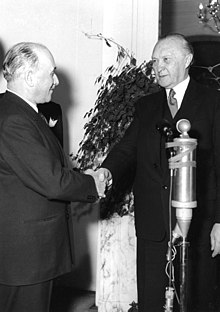Planification

Planification (French, pronunciation [ planifika'sjõ ]; eingedeutscht planification ) referred to in the economic history of France , the system of state planning of the economy . It was created in 1946 by Jean Monnet on the basis of previous French experience of the interaction between the state and the economy. The procedure was changed several times in the following planning periods.
history
After the First World War , the “mixed company” type was created. This partnership between private and public capital was intended to enable national industry to penetrate areas in which private capital alone did not dare (oil industry: Compagnie Française des Pétroles (CFP) , chemicals). Previously, in similar cases in France, the state had granted an exclusive concession to a single company .
In contrast to its British counterpart, the Anglo-Persian Oil Company (later: British Petroleum ), which Winston Churchill had set up before the First World War, the French government, although it often only had a minority stake, does not waive their involvement in the management of the companies concerned. In addition, as a result of the First World War, the French state came into possession of German productive assets, such as the coal mines in the Saar region and the Rhine shipping company . In 1924, an advisory body, the National Economic Council, was created to plan the nation's investments over the long term. In 1926 and 1929 there was a plan on national equipment ( Outillage National ).
The existence of a relatively large sector of state or state-influenced companies was on the one hand the prerequisite and on the other hand created the need to coordinate state economic and industrial policy in the long term.
A kind of “indicative planning” prevailed. In doing so, more attention is drawn to the goals that are worth striving for, instead of being ordered through administrative channels. Due to the weight of the companies in the mixed economy, it was usually in the interests of purely private companies to orient themselves towards the targets set by the planning committees.
See also
literature
- Claude Gruson: Origine et espoirs de la planification française. Dunod, Paris 1968.
- Émile Quinet: La planification française. Presses univ. De France, Paris 1990.
- Andrew Shonfield: Planned Capitalism. Economic Policy in Western Europe and the USA. With a foreword by Karl Schiller, Kiepenheuer & Witsch, Cologne / Berlin 1968.
- J. Black: The Theory of Indicative Planning. Oxford Economic Papers, 1968, 20, pp. 303-319.
- Gerhard Tholl: Is the French planification a role model? Ordo. Yearbook for the Order of Economy and Society. Düsseldorf / Munich. - Vol. 15/16 (1965), pp. 197-274.
- Frank Sammeth: The reconstruction and economic development of West Germany (FRG) and France in comparison. 1944/45 to 1963. Verlag Dr. Kovacs, Hamburg 2005, ISBN 978-3-8300-1868-1 .
Web links
Individual evidence
- ^ Duden online: Planification
- ^ Elmar Altvater: France's fifth economic plan. (PDF; 44 kB)
- ^ A. Chazel, H. Poyet: L'Économie mixte. Paris 1963.
- ↑ Andrew Shonfield: Planned Capitalism. Economic Policy in Western Europe and the USA. With a foreword by Karl Schiller. Kiepenheuer & Witsch: Cologne, Berlin 1968. P. 94 ff.